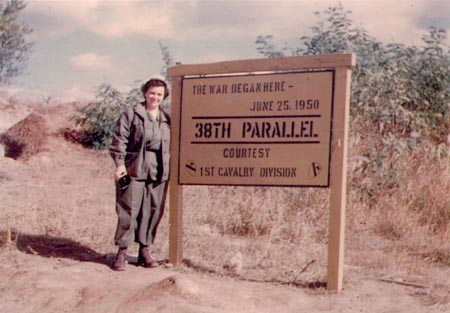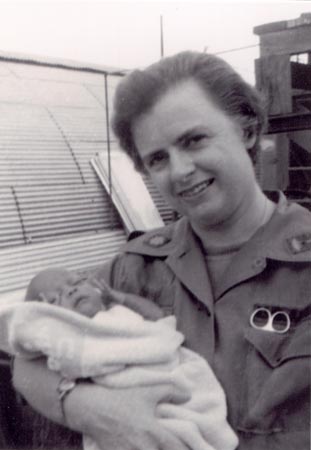Army Nurse Corps History Home > Army Nurse Corps Historical Documentation > Army Nurse Corps Newsletter Historical Articles
Major Mary C. Quinn, ANC
Chief Nurse, 71st Evacuation Hospital, Pleiku

1st LT Mary C. Quinn, ANC
Picture taken at 38th Parallel sign across
the street from the 8055 MASH
1951 - South Korea
Inthe midst of deployments and ominous discussions of further action in SouthwestAsia, the Army Nurse Corps will celebrate its 102nd Anniversary. On 2February 1901, the Army Nurse Corps was founded as a distinct yet integralbranch of the Army and its medical department. As Army Nurse Corps Officers, we have an obligation to connect with ourhistory. Our history is testimonyto what the Army Nurse Corps has done and to what we do every day. History provides present day Army Nurse Corps Officers with a framework. The experiences and lessons of our predecessors guide our present dayactions. History is truly our linkto understanding the past, defining the present and influencing our future. The current focus on deployments encourages a look at past operationsthat the Army Nurse Corps has supported. Thefollowing excerpt, written in 1968, is taken from an orientation letter sent tonurses preparing to deploy to Vietnam. MajorMary C. Quinn, Chief Nurse, 71st Evacuation Hospital, Pleiku,Vietnam, writes in hopes of inspiring the young nurses that will soon staff herhospital. Almost 35 years later,present day military nurses can distinguish countless parallels. This is the value that history offers.
The followingwords are part of the orientation presented to newly arrived Army Nurse CorpsOfficers at the 71st Evacuation Hospital. They consist of thoughts, observations, and suggestions gleaned fromthe many fine nurseswho have served on the nursing staff of this installation. Perhaps they willhave some meaning for other nurses in country. Perhaps too, they may serve tostimulate others to take pen in hand and share the fruits of knowledge availableat each unique medical facility spread throughout this land of South Vietnam.
Nursing in acombat area has many unusual features - some good - some bad. Thephilosophy of nursing you bring with you will have a lot to do with how thisyear in the Republic of Vietnam will affect you. You cannot come to your DEROSthe same individual you were on the day you arrived in country. You will beeither a better or worse nurse--a better or worse person. The outcomewill depend primarily upon yourself.
Let us look at some of the plus signs for personaland professional growth and development. One of the biggest blessingsencountered over here is that the American soldier who comes under your care isthe most wonderful patient in the world. His ability to accept the misfortunethat brings him to the hospital and to continue to be combative against theforces of pain, infection, disfigurement and frustrating helplessness isphenomenal. More remarkable, however, is the fact that he will try to make youfeel you are "the greatest" because you care for him in his hour of need. That you docare, really care, for himnot only as a patient but as a person is essential if your work is toremain meaningful and satisfying. If youshould cease to care you become crippled personally and professionally. It is,then, essential that you do not allow work routines to become monotonous and robyou of this great opportunity to practice the fine "art" of nursing at every bedside day or night.
Another facet of life here in South Vietnam is the realization of how much stamina youpossess. Long hours, tense days and nights, heavy workloads and close day-to-daycontact test your mettle and the moment of reckoning must be faced by all.
After the twoincidents at this hospital when the dangers of war invaded our compound inthe form of exploding 122mm enemy rockets, the most heart warming lessonlearned by many was that the concern for the patients was uppermost in their mindseven with "bombs burstingin air." The heroic actionsof the men and women on the wards during those terrible moments saved the livesof more than one patient confined to bed and incapable of helping himself. Thecall "Nurse" brought instant response. Some people were very surprised and,of course, very pleased to realize they had acted so calmly and efficientlyunder stress. It was a good feeling!
The unusual andsometimes awesome task of handling mass casualty situations not just once buttime and time again sharpens your ability to organize the availableresources and to improve all your nursing skills. With experiencecomes the knack of differentiating between the routine case and the urgent case.The wound of entrance may appear deceivingly minimal to the uninitiated.The need for careful scrutiny and constant attention tovital signs soon becomes second nature to the combat nurse.
War in Vietnamis not only bloody wounds and broken bones. It is also a battle against diseasessuch as malaria and hepatitis. You as the nurse can be a lifesaver for thepatient who develops the insidious symptoms of cerebral malaria. You mustbe alert to the clinical manifestations warning of this dangerous complication.Your astute observations, carefully recorded and related to the medicalofficer, are of the utmost importanceif treatment is to be of any avail.
The opportunityto take an active part in medical and nursing research is always just around thecorner if you are willing to look in that direction. The wealth of materialavailable for those who have the urge to write for publication is tremendous. Alittle perseverance and encouragement from friends and neighbors goes a longway.
Interest in Civic Action Programsamong the local population also provides anoutlet for satisfying professional and personal growth. Even though limited inmany respects, the little that can be done in teaching and guidingVietnamese and Montagnard students in thefundamentals of care of thesick and wounded is a worthwhile undertaking. Many times you may be hampered inthis work by enemyactivity, curfews or disinterest among the people you would like to help.By doing what you can,when you can, you will leave something worthwhile behind you when your tour is up.
You may findyourself developing ambivalent feelings about the patient load as the weeks andmonths progress. If the hospital is busy the time passes faster and aftera hard day's work you can go to your hootch tired butwith the feeling you are needed and being here is really necessary andworthwhile. However, this means men are facing the enemy in frightful conflictand for some, release frombattle will only come with death. If the wards are quiet time drags,boredom sets in and tempers grow short but then you are aware that during thesequiet times there is a respite from the fighting and people are not beingbrutally wounded or killed.
Now, when those 365 "short" days arecompleted and you come to that long awaited DEROS it is hoped you will be ableto look back and be satisfied that you:
D: Demonstratedclinical competence
E: Experiencedprofessional growth
R: Renderedservice with skill and compassion
O: Obtainedgreater insight into your personal strengths and weaknesses
S: Succeededin becoming a better nurse and a better person
MaryC. Quinn began her military career in 1950 as a general duty nurse atFitzsimmons General Hospital in Denver, Colorado. She served in Korea with the 8055th MASH from February 1951until May 1952. After multipleassignments that took her to Germany, Japan and many stateside posts, she servedin South Vietnam from June 1967 until August 1968. She retired from active duty at the rank of Colonel in November 1976. Col (R) Quinn, after 26 years as an Army Nurse Corps Officer, believesthat nursing in a combat zone hospital can never be forgotten. At a memorial ceremony honoring military nurses in Weymouth,Massachusetts in November 1987, COL Quinn stated, 'The nurse must be armed tofight just as the soldier, sailor, or marine. The nurse's weapons are knowledge and skills that can be employed towage war on disease and injury wherever these calamities have laid low a man,woman, or child.'

Major Mary C. Quinn, ANC, holding
Baby "Barbara," a baby born at the 24th Evacuation
Hospital, Long Binh, South Vietnam
12 November 1967
Aswe celebrate our 102nd Anniversary and prepare for an uncertainfuture, take a moment to capture strength and inspiration from the rich heritagethat the Army Nurse Corps proudly embraces. Army Nurses: Ready, Caring and Proud.
Historical Data located at the Army Nurse Corps Archives,United States Army, Office of Medical History, Office of The Surgeon General,Falls Church, VA

